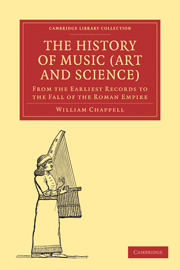Summary
Whenever the Greeks wished to compliment an eminent poet-musician upon his having introduced some novelty in the style of his poetry and recitation, they chose to express it by the figure of speech, that “he had added a new string to the lyre.” The phrase was happily selected to express that he had enlarged the powers of instrument and voice; but it was as purely figurative, as if we were now to say familiarly of a man who had made some useful discovery, that it would be “a feather in his cap.” In later ages this mere idiom came to be appropriated by certain Greeks in a literal, instead of a figurative, sense, and hence the long and conflicting list of double and even triple claimants for every string to the lyre, such as that copied by Boethius, into his treatise upon music.
As to the addition of one or more strings to the Octave system, even if the scale had not been borrowed entire, it would have required no genius to make such a discovery as, that, if one note had its Octave, another must have the same. The first Octave sound discovered was the clue to the whole series, as is sufficiently proved by the Magadis and the double flute, which are older by many ages than the Greek claimants for the added strings.
- Type
- Chapter
- Information
- The History of Music (Art and Science)From the Earliest Records to the Fall of the Roman Empire, pp. 91 - 106Publisher: Cambridge University PressPrint publication year: 2009First published in: 1874



